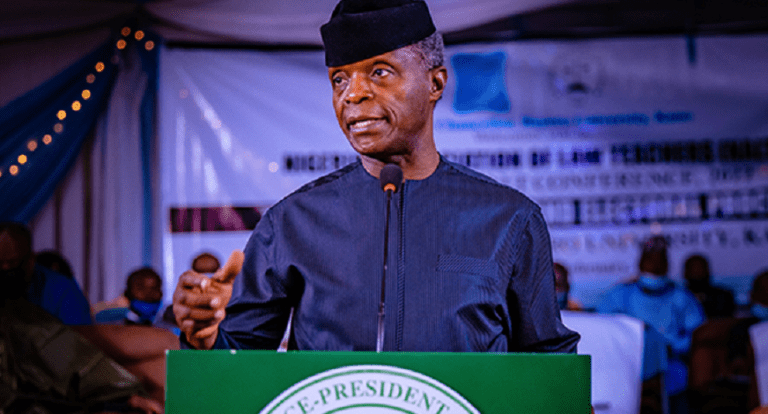
Prof. Yemi Osinbajo, the Vice President, said yesterday that Nigeria was programmed for greater heights because of its citizens’ resilience and great potential.
He also stated that the federal government recognizes the importance of the private sector in delivering value to the Nigerian economy and is committed to maximizing collaboration opportunities in order to usher the country into a more prosperous new decade.
Read Also: Baba-Ahmed Slams National Assembly For Rejecting Gender Bills: “It’s Tragic”
The vice president, speaking at the official inauguration of the Chartered Institute of Bankers of Nigeria (CIBN) Bankers House in Abuja, said Nigeria was poised for great things, not only because “it is a nation of great dreamers and great doers,” but also because of the people’s resilience and potential.
“With the continent’s largest market, a growing demography of ambitious, tech-savvy young people, and accelerating regional integration and connection to new markets, Nigeria has been given an unprecedented opportunity to usher the country into a new decade of sustained prosperity.”
“This is an opportunity that we as a government are fully committed to transforming into lived realities for millions of Nigerians across the country.”
“We have soared and risen above our problems every time Nigeria was expected to sink.” We’ve found joy in the midst of despair and the strength to persevere in the face of the most difficult challenges. “The Nigerian spirit continues to be unfazed and bankable,” he added.
“At this critical juncture, realizing the country’s potential will require the careful choreography of government policies that remove every impediment in the way of those determined to pursue their dreams and build businesses,” he said.
In this regard, Osinbajo emphasized the impact of government policies, such as the work of the Presidential Enabling Business Environment Council (PEBEC) to improve Nigeria’s business environment and economy.
Read Also: Two Football Stars killed In Russia-Ukraine Conflict
The vice president stated that the Buhari administration had “aggressively pursued the creation of an environment that allows Nigerian businesses, at every level, to operate without the bottlenecks and drawbacks that have come to characterize their interface with agencies and regulators” over the last six years through PEBEC.
With the launch of PEBEC’s 7th 60-day National Action Plan (NAP 7.0) on the Ease of Doing Business, he added that the government was “building on the progress of these reforms and aggregating lessons from some of the setbacks in their implementation.”
The NAP 7.0, which began on February 7, was scheduled to last until April 7, 2022.
“We will build on our successes in removing regulatory barriers to agro-exports, driving electronic tax filing, and working closely with states to improve their own business environments,” he added.
He also reaffirmed the administration’s commitment to implementing its economic policies in order to improve the lives of Nigerians.
“This largely informs the zeal with which we are implementing our new National Development Plan, 2021-2025,” he says, “a medium-term agenda that seeks, among other things, to generate 21 million full-time jobs and lift 35 million people out of poverty by 2025.”
“The plan commits the government, at all levels, to an investment of about N49.7 trillion, and envisages private sector investment of N298 trillion, making a total of N348 trillion,” the vice president said, emphasizing the importance of “a conscious reliance on private enterprise and initiative” in the plan’s successful implementation.
“A range of fiscal, monetary, and trade measures, including more intentionally promoting productivity and value addition, are expected to support the plan’s implementation,” he added.
In addition, despite “several years of some of the most severe macroeconomic challenges – including the 2008 financial crisis, the oil crises that followed, and an unexpected pandemic, the Nigerian banking industry, owing largely to your outstanding professionalism, has continued to show incredible resilience and growth, contributing about N34.6 trillion to the Nigerian economy,” the vice president stated.
Read Also: Verve Card Now Accepted by KCB Bank Network’
“In 2021 African tech startups raised over $4 billion in funding, with over 564 startups across the continent solving critical problems in almost every sector,” Osinbajo said, referring to the rise of Nigerian unicorns in recent years. Nigeria accounted for 35% of the total. Nigeria now has six unicorns, or tech companies with a market capitalization of more than one billion dollars. They all started after 2015 and grew in the midst of two recessions.”